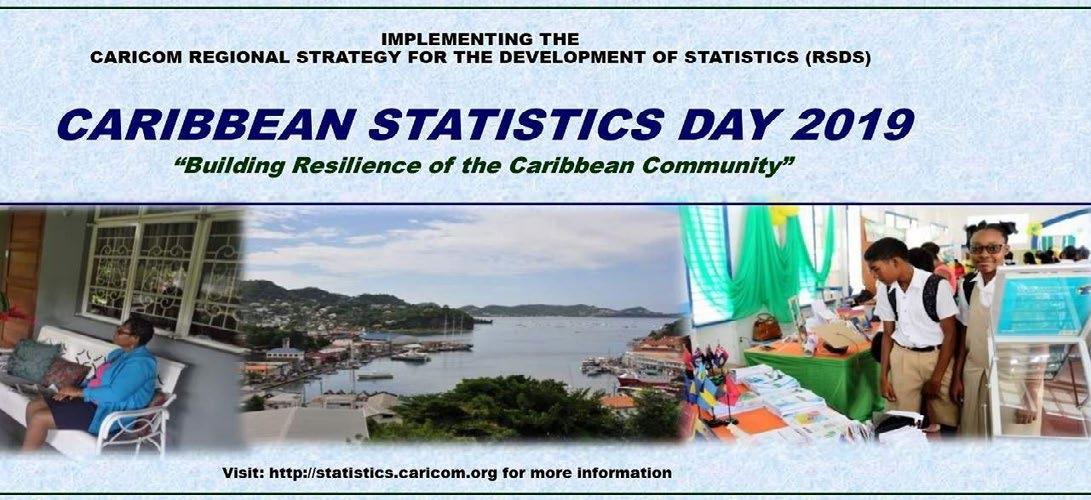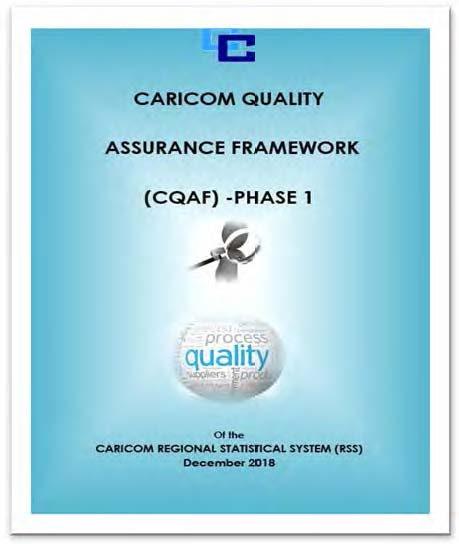
5 minute read
Section VIII - Statistics
SECTION VIII
STATISTICS
In endorsing the Regional Strategy for the Development of Statistics (RSDS) in 2018, Heads of Government had also approved the preparation of accompanying frameworks to support the Strategy, namely an implementation plan, a communication and advocacy strategy, a resource mobilisation strategy, and a monitoring and evaluation framework.
The Implementation Plan for the RSDS was completed in February. The Plan, which covers the period 2019–2030, centres around the five strategic priorities of the Regional Strategy, namely standards and harmonisation, governance, integrated statistical system, innovation, and advocacy and communication.
The Plan focuses on the ultimate outcome of the RSDS: A CARICOM Statistical System that is recognised for professional excellence and is the premier source of high-quality, harmonised statistics on the Community. It comprises major activities and outputs as well as immediate and intermediate outcomes that can lead to the achievement of the ultimate outcome. It also includes information on responsibilities and timelines for the delivery of results.
Work commenced during the year on the Resource Mobilisation Strategy to fund the RSDS.
Regional Strategy for the 2020 Round of Population and Housing Census
In October, the COHSOD-Education discussed the 2020 Population and Housing Census, expected to commence in mid-2020. The Ministers recognised the central role of the Regional 2020 Census Strategy as a fundamental initiative under the RSDS.
The Common Census Questionnaire was revised during the year to incorporate questions on time use of individuals in households and provide greater clarity for some other questions. The Questionnaire was developed by Member States and the Secretariat in 2017. In addition, the Secretariat produced methodological guidelines for the Common Census Questionnaire for use by Member States in preparing their census questionnaires and manuals.
Also during the year, work progressed under the Inter-American Development Bank (IDB)-funded project Support to the Regionally-Coordinated Census Strategy-Common Census Framework 2.0. Consultants were recruited to implement the three components of the project and work plans were prepared. As part of component I, an assessment of the Mapping/Geographic Information Systems (GIS) in Member States was completed.
Component I Development of a common framework for the conduct of computer assisted personal interviewing (CAPI)
Component II Development of a common approach to census mapping
Component III Development of a project management framework for census planning and execution
Under the project, and in collaboration with Grenada, work was put in place to develop the Common Census Questionnaire in the Survey Solutions software application. This programme can be adapted by other Member States for census data collection, using a CAPI system.
During the year, the Secretariat created an online Census Knowledge Base System, which includes a blog and a document centre for information exchange and networking to address challenges and share best practices.
2030 Sustainable Development Goals (SDGs): CARICOM Core SDG Indicators
Following the endorsement of the 125 core SDG Indicators by the COHSOD in 2018, four countries submitted information on the Indicators. Publications from the voluntary national reviews of countries that contained some SDG Indicators were downloaded from Member States’ websites.
Efforts were also made to integrate the collection of the SDG Core indicators within the existing data collection systems in the areas of economic, social, environmental, and ICT statistics.
Statistical Advocacy
The Community observed the eleventh commemoration of Caribbean Statistics Day (CSD) on 15 October under the theme, Building Resilience of the Caribbean Community, the overarching theme of the RSDS
In his commemorative message, the Secretary-General applauded CARICOM Statisticians for pursuing their dream and vision of having a viable and effective CARICOM statistical system. He underlined his support
for the strides undertaken in this regard, led by the Standing Committee of Caribbean Statisticians (SCCS), indicating it was all being pursued to improve the lives of the people of our Community.
As part of CSD 2019, activities were held in Member States and at the Secretariat to promote the use and benefit of statistics. These included seminars, panel discussions, displays, and exhibitions.
A seminar was held at the Secretariat featuring a presentation on the RSDS and presentations highlighting the importance of statistics to programmes in the areas of agriculture and rural development and ICT for development.
The Eleventh Annual Inter-School Quiz Competition for Primary and Secondary Schools in Guyana was also held as part of the observance. The Quiz was hosted by the CARICOM Secretariat and involved six primary and six secondary schools. Leonora Primary School in West Coast Demerara and Annandale Secondary School in Annandale, were the winners. Shiv Piterahdane of Leonora Primary School and Ghansham Allijohn of St. Stanislaus College, Georgetown, were the outstanding students.

Competitors in the Primary School category Competitors in the Secondary School cateogry

Building Systems of Statistics
Phase I of the CARICOM Quality Assurance Framework (CQAF) commenced during the year. The Framework seeks to improve the quality of statistics produced at the regional and national levels. The SCCS had agreed to the development of CQAF in 2017.
As part of Phase I, the Framework is being piloted in four countries, namely The Bahamas, Grenada, St. Kitts and Nevis, and Suriname. Training materials were developed and in June, a sensitisation session was held for the pilot countries.

The CQAF is guided by the fifteen principles of the CARICOM Code of Good Statistical Practice (CGSP) developed under a 9th EDF project. During the year, the fourth CGSP self-assessment (2019-2020) commenced with questionnaires submitted to Member States.
The following databases were updated during the year:
^ Demography and Social/Gender Statistics ^ Health (information for twelve countries) ^ Labour/Employment (information for ten countries) ^ National Accounts (information for twelve countries) ^ Merchandise trade (information for fifteen countries)
In addition, indicators for the CARICOM Human Resource Development 2030 Strategy were reviewed and recommendations provided.

